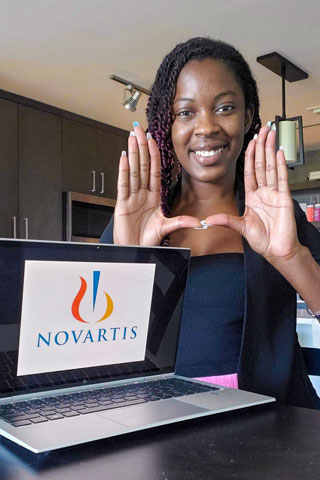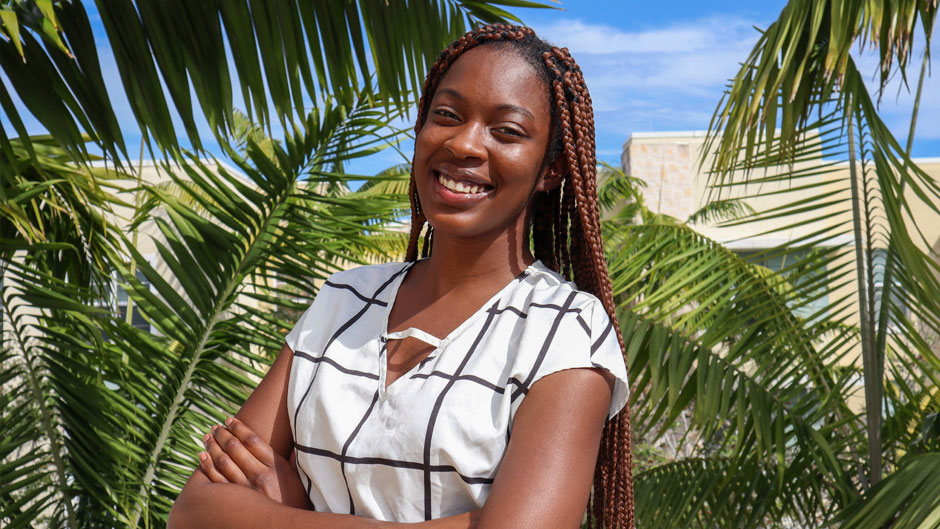Collette Thomas knew that she wanted to get into the health care field. But the length of time needed for medical school swayed her from that route.
Yet, when a friend told her about the role of biomedical engineers in designing life-changing devices for patients, Thomas was interested. That prompted her to apply to the University of Miami’s College of Engineering, where the Jamaica native is now a senior studying biomedical engineering.
Thomas’ interest in the field continues to grow. In between classes, she spends time each week working in the lab of environmental engineering professor Helena Solo-Gabriele, who is leading a study about tracking COVID-19 in wastewater. The professor also is working on another project about the role of dust in children’s health. In addition, Thomas works in the lab of Patrick Ganzer, an assistant professor of biomedical engineering at The Miami Project to Cure Paralysis, where she is helping him to investigate potential treatments for spinal cord injury.
These experiences helped the senior garner a paid internship last summer at Novartis, a pharmaceutical company. She acquired the internship through Handshake, the job and internship search platform provided through the University’s Toppel Career Center. And Thomas even earned a Toppel Internship Fund scholarship to help pay her rent.
Thomas shared more about her recent experience at Novartis.
What motivated you to get an internship?
I’ve been working at The Miami Project to Cure Paralysis with Patrick Ganzer and we are doing training with animals to help them get a certain level of mobility after a spinal cord injury. That piqued my interest in going into clinical trials, and I knew I needed to get an internship this summer. So, I was looking around when, conveniently, a recruiter reached out to me on Handshake. She said she was interested in my profile, and she even sent me a link to apply for internships at Novartis. One was to work on an early phase clinical trials team. This interested me because I am doing similar things at the Miami Project. Eventually, I got an interview, and I got the internship last March.
Was this your first internship, and did you enjoy it?
 Yes, it was my first internship. Overall, it was a good internship experience. The first week I spent time emailing people to try and figure out what I needed to do. But it also helped me learn initiative, because I was a remote intern. So, it wasn’t a situation where I was sitting in an office waiting. Eventually, I got in contact with the training manager and got my trainings assigned. After that, the internship really picked up. And I started meeting people on my team, which was the early phase clinical trials team.
Yes, it was my first internship. Overall, it was a good internship experience. The first week I spent time emailing people to try and figure out what I needed to do. But it also helped me learn initiative, because I was a remote intern. So, it wasn’t a situation where I was sitting in an office waiting. Eventually, I got in contact with the training manager and got my trainings assigned. After that, the internship really picked up. And I started meeting people on my team, which was the early phase clinical trials team.
What types of things were you doing each day, and what did you learn?
Overall, I learned how to run a clinical trial, paperwork-wise. More specifically, I learned a lot about how to work with software platforms that are used to organize clinical trials. We used [programs] for uploading classified documents or viewing documents because Novartis has sites in the U.S., Switzerland, and elsewhere across the world. With these software systems, you can view documents from clinical trials across countries.
We also looked at the medical licenses of people and physicians who were going to carry out our clinical trials, as well as organized patient information, and informed consent documents. I learned a lot about transferring documents safely and privately.
Some days I would help with document uploads and emailing people on different trials. Other days, I’d sit in on meetings to learn how certain trials were going, and staff from Novartis discussed the progress of these trials and if they were near closeout. Then, they could move on to phase two.
I also worked on a standardization project for clinical trials in Microsoft Teams, where we used the software to organize aspects of a clinical trial into folders. So, if one manager left, documents and information could easily be found by a new manager. We were able to make it more efficient and easier to navigate.
Do you think you would want to work at Novartis, or another pharmaceutical company, in the future?
Right now, I’m not sure. I really liked working with Novartis and the community there. But I am not sure if I would go back to phase one of clinical trials. I think I would prefer to be in the field, talking to patients, because I really do love research. Through my experiences on campus, I have learned that I prefer hands-on tasks in the lab, as opposed to computer work. If I don’t go into private industry, I will definitely be applying to graduate Ph.D. programs in biomedical engineering.
Do you have any advice for University students about internships?
If you’re a junior, yes, you need an internship, or you should try to get one. It’s time to get out there—especially if you don’t know the path where you want to go after college. An internship can help you figure that out and narrow your options. It also really helps you to network within your industry, which is something that I think you can’t get far without. An internship helps you to build a network of people that you can continue speaking with afterward, which can definitely help you land a position at the same company where you interned, or these contacts can give you a recommendation at another company you’re interested in.
To learn more about internships, visit Handshake, or get assistance from a career counselor at the Toppel Career Center.

